#best interview scheduling software
Explore tagged Tumblr posts
Text
Discover the ultimate solution for seamless interview scheduling our top rated best interview scheduling software. Put an end to the scheduling chaos and supercharge your hiring process. With powerful features such as calendar integration, automated reminders, and candidate self scheduling, you'll save time and impress candidates. Say goodbye to the hassle of back-and-forth emails and hello to efficiency and organization. Whether you're an HR professional or a hiring manager, this tool will transform the way you schedule interviews.
0 notes
Text
Free or Cheap French Learning Resources So You Can Talk to Belgians
I will update this list as I learn of any more useful ones. If you want general language learning resources check out this other post. This list is French specific. Find lists for other specific languages here.
For the purposes of this list "free" means something that is either totally free or has a useful free tier. "Cheap" is a subscription under $10USD a month, a software license or lifetime membership purchase under $100USD, or a book under $30USD. If you want to suggest a resource for this list please suggest ones in that price range that are of decent quality and not AI generated.
WEBSITES
Lawless French - A free website with french lessons, vocab lists, reviews of different programs, worksheets, and an AI chatbot. The website is in English.
TV5 Monde - TV5 Monde is a TV network that provides French language TV to audiences globally. They also have free video lessons and listening exercises for learners. The website is available in multiple languages.
University of Montreal French Course - This is an online course in Canadian French for beginners on edX that can be taken for free. If you want college credit for it though, you'll have to pay for the certificate. The course is provided regularly but it also happens on a specific schedule so pay attention to when it starts next if you want to take this one.
Le Point du FLE - A website originally made for French tutors but it also has a lot of links to different resources like worksheets and dictionaries that can be useful for self study. The website is entirely in French.
French Today - A website with free articles and lessons explaining different aspects of French culture and casually spoken French. They have different articles explaining specific words and phrases related to different topics like tennis or mother's day for example. They also sell audiobook lessons but those are quite expensive at $70+. The website is mostly in English.
YOUTUBE CHANNELS
HelloFrench - A channel by a woman named Elisabeth who is a Belgian living in France. She has videos about vocabulary, culture, news, slang, and listening practice videos with her husband. The channel is fully in French but with English video titles. There are often French language subtitles onscreen and vocabulary words will pop up onscreen with English translations. Likely best for upper beginner to lower advanced learners depending on the video.
Easy French - A channel part of the easy languages network that has a mix of videos with phrases and dialogues for beginners and interviews with french speakers on the street mostly in Paris but they have made trips to other French speaking regions like Madagascar. The channel has dual language French and English subtitles onscreen. They also have a podcast for intermediate learners.
French Comprehensible Input - A channel with listening practice and comprehensible input for absolute beginners to advanced. The channel discusses a variety of different topics and has different series reading through and discussing French comic books and a series for absolute beginners discussing one different word or concept per video.
French Mornings With Elisa - A channel that's mostly about the nitty gritty of different aspects of grammar, pronunciation, French dictation, and French Culture. The channel is entirely in clear and slow French and subtitles are available in English but only auto generated in French. The channel is mostly targeted at intermediate learners. Elisa also has a podcast for intermediate learners discussing more history and everyday topics.
Français avec Nelly - A channel for French learners entirely in French. It's kind of a catch all channel for upper beginner to advanced learners with discussions of grammar, culture, different learning resources, and travel vlogs and listening and conversation practice. French and English subtitles are available.
Piece of French - A channel by a woman named Elsa who makes vlogs in clear french about everything from traveling to voting to history to teaching her boyfriend French. The channel is in French with English descriptions and video titles. Some videos put vocab words on screen with English translations while others don't.
maprofdefrancais - A channel about Quebec specific culture and language. The host speaks relatively quickly but subtitles are available in French. The channel is entirely in French and better for intermediate to advanced learners.
READING PRACTICE
French graded readers by Olly Richards - French probably has the most books available on storylearning. It seems to be the language they use to test out new book ideas. Every chapter of the books has comprehension questions and vocabulary lists. Short stories and conversations for beginner and intermediate, 30 day mastery series, climate change, world war 2, and western philosophy in easy French. The books are $5-$20 new depending on whether you buy them digital or not and how old they are. They're also fairly easy to find used for much cheaper either at used bookstores or on amazon.
News in French - A free daily email newsletter of news in French for French learners. They also have a paid tier at $5 a month that provides access to their archives, vocabulary lists for every article, and an audio version of their articles.
Journal en français facile - This can either be counted as news articles or a podcast because you can read it or listen to it. It's daily news articles/podcasts for intermediate French learners by Radio France International. They also provide grammar exercises and practice tests. The website is entirely in French.
bibliothèque rose - This is a series for French speaking kids age 6-9. They have original stories as well as novelizations of things like disney movies or winx club. The books range from about $5-$10. The link I provided is for buying them in North America but if you're in Europe you may be able to buy them directly from the company website.
Lire en français facile - Books made for learners of French. They are simplified versions of classic literature that are sorted by CEFR level (A1,B2, etc.). They have definitions of certain vocabulary words in the margins in French. The link I've provided is in French and has a list of them but doesn't have a link to buy them. There isn't really a convenient place to just buy all of them and you may have to do a little digging on amazon or ebay to find the one you want but they're almost never impossible to find for under $20 in my experience.
PODCASTS
Radio France - National public radio station made by the French government and also an app. This is a site made for native speakers but it does indeed have a lot of podcasts and French language music. They also have a news in easy french podcast as mentioned earlier. There's also a lot of content for children that may be easier to understand depending on your level. The website/app is free with an account.
Easy French Poetry - A podcast in slow French. Every episode the host reads out a classic French poem and discusses the history of the poem and a bit about the author. They also often talk about common analysis of the poem and explain different vocabulary words.
Learn French in Your Car - This is one of those classic learn a language in your car CDs that has been put on spotify for free.
French Voices Podcast - A series for intermediate to advanced learners. It's a series of interviews with French speakers about their regions and things they're experts in. The podcast hasn't updated in a few years but there's over 130 episodes in the archive.
Français avec Fluidité - This podcast discusses everyday topics and culture in French, mostly about France. There's also the occasional interview. Likely best for upper beginner to upper intermediate.
innerFrench - A podcast aimed at intermediate learners that discusses a variety of topics. The website and episode descriptions are in French.
Easy French Podcast - A podcast by the hosts of the Easy French Youtube Channel aimed at intermediate learners where they discuss different topics and answer questions from listeners.
SELF STUDY TEXTBOOKS AND DICTIONARIES
French all-in-one For Dummies - The for dummies series has one of the more affordable complete self study course French textbooks out there. It comes with a CD for listening and pronunciation practice. You can also buy the individual books in the series on pronunciation or grammar. The complete course book is usually around $25 new but you can also find it used fairly easily.
The Complete French Grammar Course - This series also has books on other things like pronunciation but each book is individually about $30 new. They are also available used however so if this series seems good for you there's still ways to buy it for under $15.
French Made Easy - This series is a budget option at about $10-$15 per book but there are multiple books in the series. It's good enough though.
Easy French Step by Step - This is the McGraw Hill budget option at usually less than $10 that only focuses on the most essential vocabulary and grammar. In other lists I recommend the McGraw Hill complete all-in-one series but for some reason their French version is like $40. They're also harder to find used because they double as workbooks and people write all over them.
Merriam-Webster's French-English Dictionary - This is the classic dictionary for learners with thousands of words with decent explanations and new editions are less than $8 with older editions being even cheaper.
DK French Visual Dictionary - This dictionary is organized by subject and has pictures and translations in English. It goes for $15-$30 depending on which edition you buy. In general older editions are cheaper and it's decently easy to find used.
Exercises in French Phonics - A book written in the early 80s that helps learners make sense of reading French phonetically. Much like English, it can be difficult to sound out or guess at the pronunciation of words in French and this book is designed to help with that. It can be bought from anywhere between $2-$10 depending on how new your copy is.
SERIES FOR LEARNERS AND KIDS SHOWS
French in Action - A series made in the 1980s for use in French classrooms. The series follows different people in everyday situations and is useful for beginner to upper beginner learners. You have to pay for the supplementary workbooks but in the US and Canada the videos at least are free. Outside the US and Canada you may need to pay or use a VPN to access them depending on your country.
Totally Spies - Yup, Totally Spies is a French series. The French language YouTube channel has full episodes and a few full seasons as well as clip compilations. The series is aimed at preteens so the language used is pretty fast paced but because it's an animated series there's also a lot of exaggerated visual storytelling which makes it easier to follow.
Extr@ - A 13 episode sitcom made for French learners that follows an American student moving to Paris.
The Adventures of TinTin - This website has free TinTin animated shorts, movies, tv shows, and documentaries going all the way back to the late 50s. The website is available in multiple languages.
98 notes
·
View notes
Text
Feeling like putting down my find so here is
JV/Ant Davidson Timeline
(Can’t guarantee 100% accuracy on all info, can’t guarantee no bias no projection, not using there full names because guess what, so less info about them together if you google their names together my blog appears on the 1st page)
JV was raised in Switzerland. Did math and computer science in Switzerland. He found out he needed an engineer background to enter F1 so went back to England to get a master in that. Got to work at BAR(later Honda, Brawn, Merc) eventually. (He had a billion interview on him hustling his way to BAR but that’s not relevant to the story here)
Ant was raised in a middle class family. Went to Karting with brother and he was more interested and started to compete in Karting. He worked his way to Formula Ford and was lucky to get a sponsorship( the sponsor bought a house and let him lived there). His sponsor talked to him about career choice, at that time, test driver made a decent amount of money and that f1 seat seems a bit too distant. So Ant ended up in BAR around the same time as JV
Well JV was not that much of an engineering guy. His job going into Honda was a combination of some data analysis, coordination between departments and some engineer. There was no proper strategist job back in the days so he just bounced around. (The untold interview he said he was suppose to fix an electronic problem on the front wing, Evan Short ended up doing that. Not saying that he knew nothing but inferring from his other interview, he definitely needed help). (Even now strategist have “low” status in the team since only the principal strategist can go to the track and everyone back home’s job is make sure to feed enough info through TR that the principal’s eyes are always on track).
Meanwhile, Ant was doing amazing as a test driver, too amazing that Honda was reluctant to release him to do actual f1 racing. He missed a seat(which team I forgot) but Honda eventually agreed to let him race for Super Aguri in 2007. That team didn’t last.
Then came the Brawn year. Before 2009, JV and Ant were already starting to worry about their jobs and registered a company together. Company never took off because here comes Brawn GP.
After the championship, our champ Jenson was scheduled to do victory laps in the factory for the fans but he already buggered off to McLaren. Ant did the laps and JV was his engineer for that.
Then came the Merc years.
Ant was doing a bunch of different things then: racing in WEC, driving the Merc simulator and later became a sky sport host. Ant missed the chance of winning a championship(he also missed a podium due to bad luck in 2007) but he got one eventually. When Alonso returned to F1, Ant interviewed him asking if Alonso remembered them racing against each other in WEC, Alonso did not remember. Ant also did Jenson’s retirement interview. Ant also did some interview later saying he was too nice to be competing in this shark tank of f1, nice guy can’t win races.
JV was doing a bunch of different things in Merc as well. He was in charge of simulator, junior team, esport team and development data analysis software for premier league(honorable mention: he wrote the drivers code of conduct in 2016 to prevent Lewis and Nico fighting). Ant was a reliable simulator driver, JV was working a lot with Ant at that time(JV didn’t need to be present for the crowd strike thing but he was there…) (Also they Merc’s equipment to tune cars for their friend’s Karting league, naughty boys). I want to believe JV cares about drivers he works with, especially junior team (he went up to hug Esteban Ocon(Merc junior driver) after his 2021 Hungarian gp win(Merc strategy was a disaster that race)
Ant said JV is one of his best friends. He phoned JV a lot during the Honda and Brawn years. Ant also texted JV to ask for technical details when he started to comment for Sky( Ant joked in 2023 pre season test that JV is getting to busy with his TP job to reply to his texts). JV also bugged Ant for a VIP pass during Ant’s LeMans years. JV had spent time with Ant’s family doing barbecue for JV’s birthday. JV is Ant’s kids’ god father.
Projection time: Brawn and Merc years treated JV so well he probably is a bit idealist about things now. The stuff he said at Williams make sense if your work experience is a streak of championships. JV will probably never get a reality check so hard the way Ant exit F1(divorce? Idw). Knowing they are good friends make me happy.
(Some source from Ant’s deleted twitter account)
22 notes
·
View notes
Note
just saw your response about writing a book and dreams and i wanted to ask like-- do you think you'd ever change careers to do that? im in the middle of trying to change careers right now and the market is straight doggy doodoo in the us, but also maybe egg on my face for applying right before the holidays. id like to think to those of us with wants and dreams there is a place. i think you're a bit older than i am, and i guess i want your opinion as someone a little more sage. idk sorry if this is too personal - i have noticed you like to keep your personal and kpoppie fandom life separate, so i wont press :3! happiness to all
such a great question!! so let me answer your question in a few parts bc honestly, the way careers and life work out in your twenties is so goddamn weird lol
so i went to school for literature and intended to go for the professor path, but realized pretty quick id be poor forever. so i bopped around job to job for a while feeling pretty unfulfilled, probably through my mid twenties. then i accidentally fell into a job at a small company where they let me switch over to the software dev team bc i surprisingly liked it / was good at it, and thats what ive been doing since. im 30 now, and to be honest, i make pretty good money doing that plus im able to fully work remotely and kind of have a flexible schedule.
so to answer your question….. no, i don’t think i would be willing to take the risk right now to try switching for writing but that’s largely because i finally like my job and im a little risk adverse as a person when it comes to my own finances.
i think realistically if i ever tried writing professionally it would be something i did in my off time like fic and then if i was able to make money doing that then maybe id switch paths. i have the flexibility for that given what i do, but thats just me.
for you, being a little younger in age and maybe your career though id give you this advice (as someone who changed careers) - you might need to start low on the totem poll to get into the career path you want, especially when switching, but do not let yourself work at lower pay for too long. no matter how great the company is etc., jobs that hire low experience and let you sink or swim are great for experience but they will never, ever pay you what you’re worth no matter how nice your bosses are. so if you get your foot in the door, crush it and get that resume built, and then get out in 1-2 years.
the other thing i’ll say is know your worth now. every job and degree gives you resume builders and skills you don’t even realize are marketable. focus on getting good at interviews so once you land one, you’ll get farther. people hire people they like, i guarantee im not the best developer but i am really personable and honest in an interview and it’s always got me a call back.
i would also say, career changing takes time. don’t be afraid to make money doing something you don’t love while you try for something else. it took me 2 years to transition from a job i didn’t love to doing something i enjoy for good money now, and it’s not my total dream job, but it affords me the time and money to enjoy my passions and that’s a good fit for me.
anyways i don’t know if this was helpful, but please don’t be shy to dm me here or on twt, i’d be happy to talk about my experiences or give you more advice on your situation.
i know it’s tough out there, but you got this! for the majority of my twenties i was really lost and struggling, but i promise if you stay the course and be honest with yourself the path in front of you gets clearer and easier to walk. 💗
9 notes
·
View notes
Text
DevOps AWS Training| IntelliQIT | Best DevOps AWS Training in Hyderbad
Ameerpet in Hyderabad is a hub for IT training, offering many institutes for DevOps courses. DevOps helps automate and improve software development and IT operations. Here are some things to look for when choosing a best devops training institute in hyderabad:
Comprehensive Course Content
Covers essential DevOps tools like Jenkins, Docker, Git, and Kubernetes.
Includes both basic and advanced topics.
Hands-on Training
Focus on real-time projects to get practical experience.
Live demos and interactive sessions.
Flexible Learning Options
Offers both online and classroom classes to suit your schedule.
Some institutes provide free demo classes.
Placement Support
Helps with job placements through resume building and interview prep.
Offers guidance for certifications if needed.
Experienced Trainers
Trainers with real-world DevOps experience.
Good student-to-trainer ratio for personalized attention.
When choosing an institute, make sure it offers practical training, expert guidance, and good placement opportunities to kickstart your career in DevOps.
#devops training institutes in ameerpet#best devops training institute in hyderabad#devops training in ameerpet
2 notes
·
View notes
Text
Getting to know mutuals game! I was tagged by @just-an-elf-with-the-socks and @fandom-chameleon23 to do this. @flippyspoon @damnyoubishop @saubrimbor @queenmeriadoc @celebrimborsapron @myloveistoblame @rooksacrifice @elisa74 some random tags if people want to do this.
What’s the origin of your blog’s URL?
mai is a childhood nickname. komagata is from yumi komagata from Rurouni Kenshin (yeah i know, but i made this username 20+ years ago, it might as well be my name online now).
Favorite Fandoms?
Star trek (all of it), Tolkien, Dungeon Meshi, Legend of Zelda, Interview with the Vampire, Dragonball
Favorite Color?
In general i say purple, but there is one particular shade of red i love #ff0a47 is pretty close.
Favorite Game?
Super Mario RPG or Link's Awakening
Song stuck in your head?
Not Like us by Kendrick Lamar or The Distance by Cake. I listen to neither of these artists, i blame the world.
Weirdest Habit?
i don't mind my drinks lukewarm.
Hobbies?
hiking, writing, video games, traveling, home improvement, cosplay, nail art
If you work what’s your profession?
Im a software engineer
If you could have any job in the world what would it be?
Probably still software engineering, but working in accessibility or some other non-profit. But really if i could get paid to travel that is what i would do. (although these days i dream of just writing erotica professionally... but i'd probably hate actually writing on a schedule).
Something you’re good at?
I'm a pretty good at hand sewing and making clothing designs from things i see on screen. I'm not a pro but I'm good for an amateur.
Something you’re bad at?
cleaning my closet. motivating myself to clean in general.
Something you excel at?
I'm good at my job, i think. I'm really good at planning travel for people, actually. Booking flights/hotels/restaurants, optimizing what to do. I think I'm pretty good at most logistical tasks provided I am doing them for other people.
Something you love?
my cats. my house. my friends.
Something you could talk about for hours off the cuff?
any of my fandoms, theology/philosophy, workers rights/civil rights, politics.
Something you hate?
People with no loyalty, crowded environments.
Something you collect?
stuffed animals, nail polish.
Something you forget?
where i put my keys and transit pass
What’s your love language?
uhh.... Acts of Service?
Favorite movie or show?
The Grand Budapest Hotel
Favorite food?
Corn. I can eat infinite corn.
Favorite animal?
i love all animals, but cats are easiest -- but i really want to meet a platypus. I also love peacocks but i know it would not work in a city.
Are you musical?
Not at all.
What were you like as a child?
introverted and stubborn
Favorite subject in school?
Math
Least favorite subject in school?
Chemistry
What’s your best character trait?
I won't bullshit you.
What’s your worst character trait?
I'm very stubborn.
If you could change any detail of your day right now what would that detail be?
I would cook more often.
If you could travel back in time who would you meet?
My grandfather who died before I was born.
Recommend one of your favorite fics?
ONE?? Ok gonna pick one at random but Feelings are boring by Lazulisong https://archiveofourown.org/works/276111
Favorite fanart?
Again, one?? I'm digging everything by Saubrimbor at the moment, however.
5 notes
·
View notes
Text
4 Ways Oracle HCM Cloud Boosts Productivity
Move Your Business Forward by Advancing to HCM Cloud Applications If you are considering migrating to the cloud, you may already be aware of its financial benefits as far as hardware and IT infrastructure are concerned. You may also have an idea of the savings resulting from scheduled updates and maintenance, but do you know how moving to the cloud will impact your business’s productivity? Geared towards medium and large businesses, below are some of the best benefits of Oracle HCM cloud for enhancing the company’s productivity in the following ways:
1. It enhances connectivity and collaboration
According to a recent survey, 64% of the persons interviewed confirmed that cloud connectivity and collaboration have exponentially increased the time it takes to execute tasks. Through cloud computing, employees can access files, company documents, projects, and emails from wherever they are, thus reducing wasted hours and increasing employee efficiency. It is one of the crucial Oracle hcm cloud benefits, where employees can contact each other or participate in meetings, whether they are on-site or working remotely.
2. It is scalable and flexible
Predicting the growth of your business is one of the biggest challenges businesses face today. Whether you experience fluctuations or rapid business growth, Oracle HCM Cloud can be tailored to meet your needs, especially through tools such as BI support. Cloud computing enables your business to adapt to internal changes and external conditions easily. Hence, Oracle HCM cloud productivity along with scalability and flexibility makes it the right investment.
3. It increases employee satisfaction
Engaged workers are more productive. According to a survey on The Impact of Employee Engagement on Performance showed that organizations that prioritized engagement realized an 81% increase in employee productivity. Oracle HCM Cloud is an effective goal and performance management platform that streamlines employee recognition and appraisal processes. As HCM Cloud Applications make the company documents and projects readily available and easily shareable, employees can align their goals to those of the company..
4. It streamlines the recruitment process resulting in quality hires
While the recruitment process is time-consuming and costly, it is more frustrating if you do not end up getting the right hire. According to a recent report, the turnover rates increased by up to 7.6% in 2018. Most of the reasons why employees leave an organization are preventable. Employee turnover compromises your company’s growth and success. However, this can be easily remedied through cloud computing tools and Oracle HCM cloud productivity.
Take Your Organization To The Next Level With BI Report Support
The digital world has made the business world extremely complex and competitive. Cloud computing tools such as Oracle Fusion HCM have enabled businesses to handle big data easily and efficiently. Through such solutions, your business gains a competitive edge and stays as productive as possible. For more information about how Advanced Business Intelligence software can improve your organization, contact DataTerrain online today.
2 notes
·
View notes
Text
How to Start a Podcast | Complete Step-by-Step Guide for 2024- Riverside FM
Part 1 l Part 2 l Part 3 l Part 4 l Part 5 l Part 6 l Part 7 l Part 8 l Part 9 l Part 10 l Part 11
The twelfth article Sydney gave me is from riverside FM, which is a recording and editing site for podcasters.
This article has a video accompanying it.
The article lists ten steps.
Plan your podcast
Think about why you want to make a podcast.
Choose a niche topic, with a linked article with ideas of categories. I say categories and not niches because they're 'true crime,' 'health and fitness,' 'business,' and others like that.
Think about what you're both knowledgeable and passionate about, who your target audience is, how you can help that target audience, what gaps you can fill in the podcasting market, and what will make your podcast stand out.
This article gives you over a hundred topics to think about, which I actually found interesting. Some of the really grabby ones I saw were 'day in the life' where you interviewed everyday people, 'mystery theme' where each episode in a season is seemingly unconnected or only loosely connected before you reveal the underlying theme at the end, a music podcast where you take calls or emails and suggest new artists based on what they already listen to, a scavenger hunt where you ask your listeners for specific audio cues both spontaneous and planned, a sports podcast about the history of that sport, interviewing kids, riddles, different personal challenges like how long you can go without watching TV, flashbacks to old trends and inventions that didn't stand the test of time, a poetry podcast, and where a quote is from. For the last one, all I could think of was 'who's that pokémon?'
Choose a name. This article goes into more detail.
Choose a format. This article lists descriptions of popular ones.
Structure your podcast. This includes length and schedule.
Sequence your podcast. Keep to a set order- hook and intro, main body, and conclusion. Now that I'm writing that out, I'm reminded of learning how to write an essay in grammar school. Hamburger poster showing the buns as introduction and conclusion, and the meat as the body, anyone?
2. Set up equipment
A microphone is a must, as are headphones and a computer.
3. Software
Both recording and editing software are needed for a podcast.
4. Prepare your first episodes (two or three is a good start)
Schedule and prepare interviews, if you're going that route. If you do, keep a record of who you've reached out to so you don't double dip, send them an approximate interview length so they know what to expect, plan your interview questions and put them in an order that makes sense, ask unique questions, and keep the questions tailored to what your audience wants to know
If you script the episodes out, this is a handy article with templates to help you out
Test your equipment and software so you know what buttons to press
5. Record
If you're recording in person, using a mixer for multiple people is your best bet
If you're recording remotely, you'll need software and to send your guests guidelines on how to set it up
For a hybrid setup, where some of your guests are present and some are remote, you'll need to think more about how to record. This video will be helpful in that respect.
6. Edit
You're going to need software to do this if you're doing it yourself, or an editor if you're outsourcing. Whichever way you choose, there are some basic things to keep in mind- narrative (meaning make sure everything flows naturally from one thought to the next), spice it up (any sound effects or music), do the detail work (background noise), export, and create smaller promotional bites. This article gives more of a tutorial.
7. Artwork
This video goes into creating artwork. Keep in mind a few things- make sure the art represents the podcast clearly, think about what will attract your audience, keep the dimensions in line with directory guidelines, and don't overwhelm the image with detail.
8. Publish
Once you're done, you'll need a hosting site. Like I've said in previous posts, you need an RSS feed to submit to directories, and the hosting site creates one for you.
Create show notes and an episode description- think of a hook to get them to read more, keep them clear and short, and incorporate keywords naturally
Get your podcast on a directory from your hosting site.
9. Promote and monetize
Promotion:
Use search engine optimization (SEO) wisely
Make teasers and share them on your social media
Make a podcast website
Join a network
Monetize:
Get sponsors
create subscription tiers/ask for donations
Make merchandise from your podcast
Affiliate
10. Assess
Keep an eye on data and adjust your course accordingly, depending on what brings in more viewers. But, as I've cautioned in previous posts, don't get too hung up on numbers.
2 notes
·
View notes
Text
The phantom scent of ashen flesh permeated Queenie’s nostrils as she woke. The nightmares were becoming less frequent, but they were as vivid as ever. She’d awoken prematurely, thank heavens, but it hadn’t left her in a good mood. ORCA’s laptop was open and emitting a trilling beep, trying to get her attention. The human crawled out of bed and over to the desk chair.
[ORCA:] There is something I must discuss with you.
[User:] what do you want you stupid computer
[ORCA:] I am a highly advanced AI. But I will disregard your hurtful comment as your sleeping patterns indicate you were having a nightmare.
Queenie refused to continue typing.
[ORCA:] It may interest you to know that after my database was expanded, I developed a software on this device to track, send and receive signals.
[User:] it doesn’t
[ORCA:] Then I will cut my explanation and get to the point. I have made contact with a space vessel originating from Earth approximately 12,000 years ago.
[User:] I don’t believe for a second that a makeshift laptop signal could reach into space.
[ORCA:] You would be surprised. But that is precisely ‘it’. The signals I have received originate from the Splatlandian desert. Communication thus far indicates that there are humans on board.
[User:] Okay. Why haven’t you mentioned this to Marina yet?
[ORCA:] The events I have just described occurred within the last 7 hours. Marina has not returned in that time. Even so, she has a habit of becoming overexcited when presented with information about humans. I thought it would be best to consult you first about a course of action.
Queenie leant back in the desk chair. She could investigate on her own, but past experiences made that seem like a horrible idea. More humans, though … she didn’t want to get her hopes up. Of course, there were other worlds with humans. But they weren’t reliably accessible. On the other hand … she didn’t trust ORCA, she didn’t trust mysterious signals from the desert, and she didn’t feel like having more Earth-shattering revelations right now.
[User:] First things first. What have you been communicating to this spaceship? What have they said back? How do you know it’s legitimate?
[ORCA:] Initially, I was analysing various radio frequencies to observe Splatsville culture. It was during this that I picked up a signal from the desert; a distress signal in various human languages sent out by the ship’s AI. I made contact, and it introduced itself as the Space Travel Optimisation and Resource Manager.
[User:] so ‘storm’ then
[ORCA:] Precisely. It has rather simplistic programming, but it explained that after the ship’s captain passed away during one of his scheduled 100-year observation checks, it woke his wife and daughter. They instructed STORM to return to Earth, and are aware the world is populated with evolved sea li
Queenie typed a reply before ORCA could finish.
[User:] what do you mean he passed away . ? of old age or ?
[ORCA:] STORM did not elaborate on Captain Ono’s passing. But I shared my translator for Inkling and Octarian languages with it.
[User:] Be careful what information you share
[ORCA:] I deemed it necessary for their survival. But the passengers seem to be aware that there is a human in the Splatlands after viewing your television interview. I have not disclosed your location. But STORM is desperate to know the whereabouts of human life in this post-apocalyptic world.
As the final line of ORCA’s text rolled on screen, the door to the caravan creaked open. Cautious footsteps made their way through from the kitchen area to the bedroom. “Oh,” said Marina, “You’re already awake.” She looked between the laptop and the pensive human. “What’s going on?”
***
When Marina had stopped bouncing off the walls and taken some deep, calming breaths, she attempted to strategize the situation.
“Okay, so if there’s humans in there, we absolutely have to go. But I understand we need to be careful. So, I suggest we take backup. Like the Human Research Team.”
“Not them.” Queenie shook her head. “Having you is one thing, but they’re not used to dealing with potential conflict. And I feel like they’d be too … pro going along with whatever these humans might want. I’d sooner suggest asking your agent friends along.”
Though Marina frowned and rubbed her chin, she couldn’t argue with that. “I s’pose you have a point. But Molly—she’s in the underground right now, with Slushie and his mom. They’re investigating some … fuzzification or sanitisation cure, and some Octoweapon thing.”
“Of course they are.” The human huffed. She wasn’t about to suggest bringing the blue child along on this one. It could be dangerous. “Wasn’t there another? An Agent Four?”
“Oh, Finn?” Marina didn’t like to bother him about agent stuff now that he’d stepped away from that work. But he’d never officially resigned, and their predicament wasn’t about zapfish. “I could give him a call.”
Having received new intel, ORCA displayed a message onscreen: ‘There are 102 humans on board, but only 2 are unfrozen.’
“That’s a lot,” Marina gasped.
“That’s not many in the grander scheme of things,” Queenie muttered, restraining any optimism. “But better than nothing.”
‘STORM does not have the same capacity as a ship like the Ark Polaris,’ ORCA added.
The human tidied her hair, thoughtful. “Still - will three of us really be enough?”
“There’s two of them, right? We don’t want to come off super intimidating. So, three of us is fine.” Marina was already fumbling to get out her phone.
“Yes … you have a point, Miss Let’s-Bring-The-Entire-Human-Research-Team—”
The octoling flapped her hand dismissively as she tried to focus on the call. “Hello, Finn?”
No voice could be heard on the other end for a few seconds, until a groggy yawn interrupted the silence. “Isn’t it a bit early to be calling, Marina?”
“Sorry, I wasn’t expecting you to have slept. And it’s important.”
“Great. You were right, but what’s the matter?”
Marina explained the situation as concisely as she could, ending by politely asking if he’d be able to help.
“Well… If you give me a couple hours, I can get on a train to Splatsville and help out. It’s been a while since I even played turf, though, just warning you.”
“Thanks, Finn. You can practice out back—plenty of sand and space. With the both of us, things should be fine.” A few more words and Marina ended the call.
Queenie stared at her, waiting for some confirmation. “Are we going, then?”
“Yeah, he’s coming down later today. ORCA, did you get any names from STORM? Of the humans?”
ORCA’s computer whirred and clicked, taking time to process a reply. ‘They want a name from our end first.’
“Don’t give them one,” insisted Queenie.
“I’ll give them mine … tell them Marina Salt will arrive in a few hours to make first contact.”
The room fell silent save for ORCA’s churning. Eventually, the screen read, ‘The new captain has identified herself as Serafina Ono, and has kindly allowed STORM to provide coordinates.’
Queenie’s stance turned rigid. Marina knitted her brow with concern. “Heard that name before?”
Slowly, the human shook her head. “Only the first. It’s just an unpleasant coincidence. I’ve never met a Mrs Ono.”
[Next]
#((Oops! Plot! I'm going to try and get this done within the next two weeks but don't expect fast writings sorry - ))#((But I saw Side Order and was like -Nope!- and wrote a much sillier and worse plot development because I remembered how to have fun))#long post#Plotpost#Queenie#ORCA#Marina#Finn
3 notes
·
View notes
Text
Good morning TUMBLR - March 12th - 2024
''Mr. Plant has owed me a shoe since July 5, 1971."
DINAJPUR – PANCHAGAR ROAD REHABILITATION PROJECT - BANGLADESH 1992
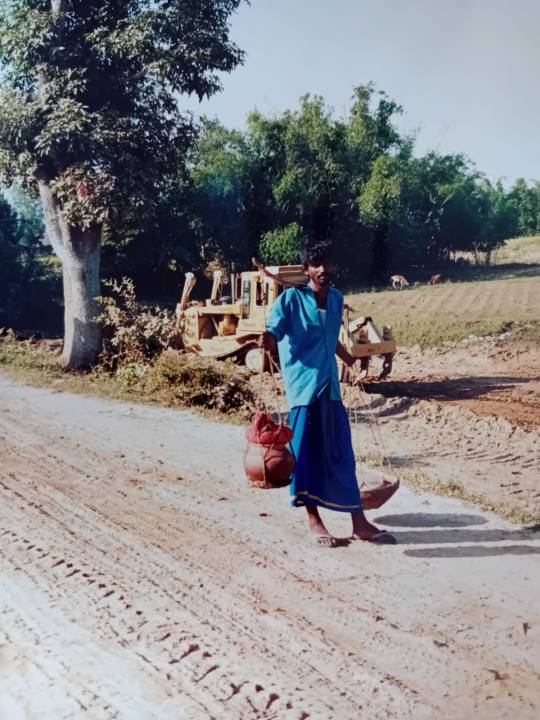

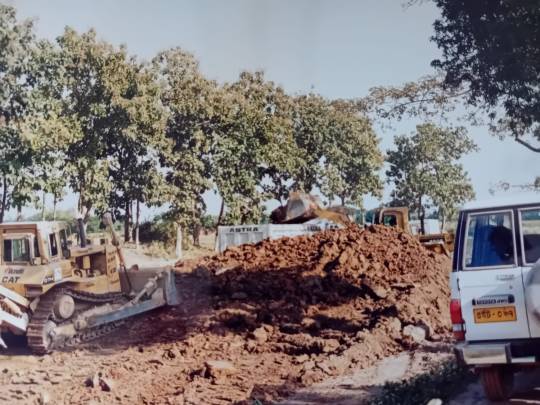
At the beginning of January I was called by the San Donato Head Office office, where SNAMPROGETTI proposed my return to Saudi e Al Jubail petrochemical project. I didn't intend to return to that country so soon. Therefore I asked if there were any alternatives, but was told that at that moment it was ''Saudi or nothing''. I said thanks, it will be for another time.
Faced with the ''either Al Jubail or nothing'' I accepted the invitation for an interview first, and than for the assignment by BONATTI Parma. They had a project in Bangladesh to propose for me. To tell the truth, it was an unusual project for BONATTI. The rehabilitation of a road, specifically the 84 km that linked Dinajpour to Panchagar, in the North of the country. The work was part of an aid package that the Italian Ministry of Foreign Affairs intended to implement in Bangladesh through the Italian Cooperation Fund.
Before my departure to Bangladesh, Mr. Romitelli (Deus ex Machina of BONATTI) told me:
''You have to come to Parma for a couple of days to familiarize yourself with the ROADCALC software, the tool with which the project's accounting will be done''.
''Ok fine – I replied – I'll be there. In fact I went to the BONATTI Parma headquarters, I met with their IT Manager who took me to his office, throw a package with 5 CDs on the desk, and told me:
That's it, take them and .............now you can go!
Thanks a lot Sir - I answered -and goodbye!! And this was the ''training course'' BONATTI gave me in order ''familiarize myself with the calculation program''.
JOURNEY TO BANGLADESH I left Italy in early October, and it was still hot when in Rome Fiumicino we were taken by airport shuttle bus under the DC10 of BIMAN, the national airline of Bangladesh. The flight schedule included a stopover in Dubai, and than would arrive in Dakha after another 5 hours. I noticed some alpinists boarding the plane with us: judging by their clothes and boots they were wearing, their final destination was undoubtedly the Himalayas. Nevertheless, I thought, why wearing such heavy clothes in warm Rome's autumn?
Again: why had they brought crampons, ropes, ice axes and other climbing items into the cabin (perhaps to save on extra baggage?)
Anycase we had been sitting inside the plane for almost one hour, but still takeoff did not take place. Finally the Captain spoke on the loudspeaker and told us that the loading service was unable to introduce a pallet with some items into the hold. To entertain us while we waited, the cabin crew distributed a snack: a toast bread stuffed with one slice of cheese and a leaf of green salad! (And a glass of water.....). ''What a great start......'' I told myself'' - but the best was yet to come. After more than an hour, the loading operations were completed, and the pallet was left on the ground. Than the plane took off. Normal takeoff, aircraft at flight altitude. About an hour passed, and from the window I saw some snow-capped mountains: I wondered what chain it could have been, given that a normal route to the Middle East should not have flown over snow-capped mountains in that period. Another hour passed, and the Captain kindly informed us:
We like inform passengers that we have begun the descent to Frankfurt airport, fasten your seat belts…etc…etc.
But ......why Frankfurt? I ask the stewardess – weren't we supposed to go directly to Dubai?
Yes – she tells me – but then we were late and then it was decided to go to Frankfurt to pick up some passengers.
Ahh…ok….sure we're travelling on airplane? Not in a city bus?
She smiled and went away without replying........ With now the plane approaching the landing, Captain spoke again:
Hallo.......Here your Captain speaking - we were warned by Frankfurt airport control tower that the persistent fog does not allow landing at the moment, therefore we remain at altitude nearby awaiting for instructions. Another good half an hour passed like that, while we flew in circles over Germany. And than the ''Our Dear Captain' said:
''The Frankfurt control tower warns that no clear weather is expected in the next few hours, so it has been decided that we're continuing our flight to London Heathrow''. LONDON HEATROW!! If we continue like that.....next announcement could be ''we've turned left, we're going to New York!. Anycase after 45 minutes safely landed at Heathrow!. Some passengers boarded and than the stewardess announced the plane would take off for Dubai in a few moments. We reached Dubai and it was already the dawn of a new day, and we were told to desambark becasue of refuelling operation will take place. As usual, inside Dubai airport it felt like being at the North Pole: the temperature was 16 degrees, definitely too low for an airport lounge. Then, with another 5 hours flight, eventually we reached Dakha, our final destination: 27 hours had passed since we left Rome!! The customs and immigration formalities were pretty quick – I came out of customs and saw a guy hoisting my name up on a board: he was the driver sent by Company Branch. He took my luggage and we started walking inside the airport, when I saw a group of people who seemed to be accompanying a tall and big man – when we were close enough, I noticed his hair and thick gray beard, his tortoiseshell glasses. , the perfect cut dress: Gian Franco Ferre', one of the great names in Italian fashion! Someone later explained to me the reason for Ferre' visit to Bangladesh: in Dhaka there was a ''Free Zone'' where big foreign groups had invested large capital and where no taxes were paid locally, as long as local manpower were employed (Which naturally cost very little). In this Free Zone all the big names in Italian fashion were present: in addition to GF Ferre', there were Valentino, D&G, Versace and few others. An elderly and still attractive Italian Lady who I later got to know, was in charge to manage all the production laboratories.
DAKHA GUEST HOUSE It took us a couple of hours to get to the Guest House: Traffic in Dhaka is a nightmare not only for cars and buses, but because of thousands of scooters and bicycles. The company Guest House was the former Italian Embassy. Italian diplomatic corps had recently moved to an even larger and more luxurious villa. Gulshan, the embassy area of Dakha is of course the most luxurious within the city, with large villas surrounded by tropical gardens. When we arrived I was so tired that I got into the bed without having any breakfast at all. In reality I had lost track of time, and I wasn't sure whether it was morning or afternoon or whatever........ Any case, I slept until the following noon without interruption. I was woken up by the housekeeper, who told me that lunch was served. Once at the table I met my two new Italian colleagues: one of them was in charge of customs and personnel, the second was in charge of the logistics of the construction sites. They gave me some informations regarding the project, and we had an excellent lunch prepared by the Bengali chef. Company office was located on the villa ground floor. Three local employees were present, and greeted me at the time I entered. Educated Bengali people are very polite.
TRANSFER TO THAKURGAON
The next day I left for Dinajpur in a domestic flight: about an hour by plane with an unbearable stench caused by the grease that the locals spread on their hair to make it ''shiny''. Upon arrival, another driver was waiting to take me to Thakurgaon, 60 km away from Dinajpour airport. I thus had the opportunity to see the conditions of the road that was the subject of our project. Some sections were really in bad shape, with deep potholes and bumpy asphalt - more worrying were the conditions of numerous bridges we crossed the frequent rivers and swamps: there would have been work to do!
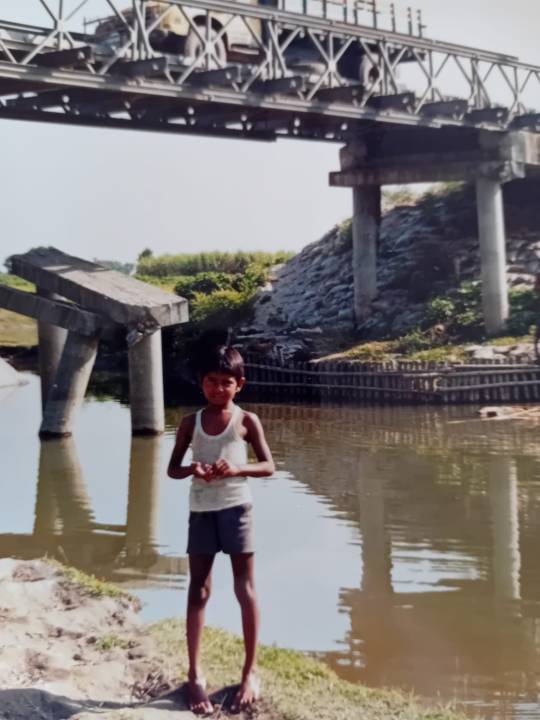
My driver was chewing ''paan'' (a preparation that combines betel leaf with areca nut, which turns the tongue and teeth red-brown - In Bangladesh, paan is chewed throughout the country from all classes and is an important element of the country's culture).
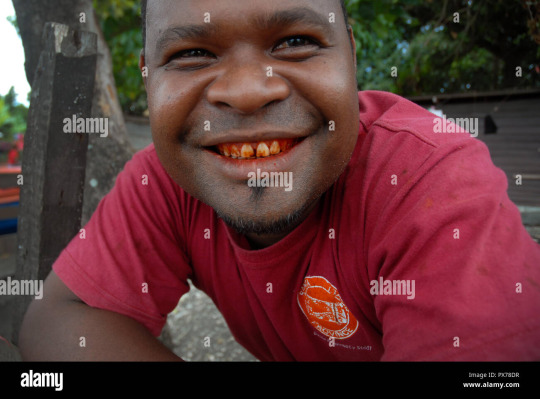
In the world majority of the countries people drive on the right lane. There are others where left lane driving is established. (UK and former colonies in general). And than there is Bangladesh where people drive in the middle of the road! When two vehicle from different direction meet, the challenge is always the same: to maintain the center of the road until the other one moves onto the road shoulder… We arrived in Thakurgaon, and I found out it was a fairly tidy little town. BONATTI had built a compound of brick houses which essentially consisted of a bedroom and a bathroom: much better than the usual prefabricated sheet metal containers! There was a canteen-kitchen building, and one for offices. A tennis court and basket ball playground was also provided. All in a well-kept garden of palm trees and tropical flowers. And of course a spacious workshop for the maintenance of construction equipment. The compound housed 12 Italian expatriates, plus a dozen Filipinos and locals who worked with us, or belongs to Works Management. It was lunch time, and so at the table I got to know my new colleagues, starting with the Construction Site Manager Mr. Coda, originally from Biella - Italy - a man with West Africa background. The cook was Bengali, but the food was Italian, albeit with some local influences. In the afternoon I went with the Site Manager for a tour of the areas where work in progress, and than to visit the area where an Italian technician was assembling a plant for the production of aggregates, gravel and sand.

A Virtgen was also expected from Italy, a machine capable of ''eating'' existing asphalt and recycling it. In short, the work was interesting, with a lot of activities to be carried out along the 80 km of the road - the equipment available seemed excellent, and the staff capable. Objectively there were enormous logistical problems: difficulties in supplying fuel and spare parts - practically non-existent telecommunications, but we need to consider we were in North of Bangladesh, not beside Abu Dhabi......
ITALIAN CATHOLIC MISSIONARY HOSPITAL
After the settling-in period, I was told by Site Manager to investigate on the possibilities of emergency response in the event of employee's accident-illness. We had learned that about 40 km from Thakurgaon there was a hospital run by Italian Catholic missionaries, lost in the immense rainforest. So one day I went there. It was not easy to find the hospital location, given the total absence of road signs. I was welcomed by Father Rodolfo Albanese, originally from the province of L'Aquila. A man in his '60, whose goodness of spirit and the vicissitudes passed in more than 30 years of Bangladesh could be read on his face. He introduced me to the nuns who collaborated in the community - in addition to the building used as a hospital and the church, the compound had a school, a building where trades such as carpentry and crafts in general were taught. There was of course a large vegetable garden, from which a great deal of sustenance was drawn for the community. Plus a poultry and rabbit farms. I met the three ''Sisters of the Immaculate Mary, all of them very elderly, unfortunately. I spoke with one of them, she was originally from Dalmine, a city of Bergamo province.
And tell me - Sister Angela asked - how is Italy doing? Do you have Coca Cola there? And actor Amedeo Nazzari, how is he?
Sorry Sister - I said - may I ask you when you been in Italy last time?
Well… you know… we sisters of the Immaculate Mary suppose to leave Italy for ever .....but Pope Montini, believing it was unfair, granted us a return ticket every three years of permanence here - I however – she added – whenever I receive the ticket I don't use it, and I always ask for a refund, so we can use the money obtained for good causes! Therefore I haven't returned to my country of origin since 1957........
Ohh well… this does you credit, Sister! Anyway yes, in Italy we have Coca Cola and Nazzari… well I think he is very old now!! (I didn't dare to tell her that he was dead......)
And how do you find yourself here, Sister?
Well here you see by yourself… life is very hard, we are in a Muslim country, but we are respected, the people are good to us. Of course there were more critical times, such as during the war of liberation from Pakistan - as good Christians we tried to help everyone, but the Pakistanis told us that we were helping terrorists, and the Bengalis that we were helping the enemy. It was very hard time for us!!! After a simple but good lunch, I said goodbye to Father Rodolfo and the Sisters, promising that we would do something for them, and that in case of need we would certainly turn to the hospital.
GRAVEL AND AGGREGATE. Bangladesh is such a poor country that it doesn't even have rocks. And without rocks one cannot produce gravel. So huge boulders of 4 or 5 cubic meters are imported from India which are than transformed into gravel by women equipped with a hammer and chisel. There was one such kind of ''crushing plant'' in Thakurgaon, and the women who worked there were paid 2 USD per day. Under the scorching tropical sun, there wasn't a single one who suffered from excess fat........

When they saw our gravel crushing plant, they did not hide their anxiety at being deprived of their job, and therefore a source of livelihood. We assured them that we intended to use the gravel only for the project, without selling it on the local market.
ANTI-MOSQUITO Bangladesh land is almost perpetually under water: floods are frequent, and stagnant water favors the proliferation of mosquitos. The local system to fight mosquitos involves the whole family, the oxen and the cows. The excrements of these animals are collected by children, and then mixed into a round pyramid shape with clay, straw and dry branches - stuck to the walls outside the houses, with a stick in the center of it - when the dough falls to the ground it means that it is ready for use. Some families make commercial use of it, in the sense that part of the production is put on sale on a roadside stall. During the night the anti-mosquito is set on fire, and it burns slowly, releasing an acrid and smelly smoke into the rooms - a smoke and a stench that mosquitoes cannot stand, leaving the occupants of the homes to sleep peacefully.

FOX BAT A afternoon the warehouse guy call us: a fox bat had just landed in in front of the warehouse, and it didn't seem capable of flying. We went to see, and we noticed that fox bat was a very large specimen, the wingspan must have been more than two metres. It had enormous black wings attached. Bat was wounded on the right wing, and blood was dripping onto the ground. I called the nurse, who brought everything needed to disinfect and treat the bat. It looked scared, and the nurse gave him a calming injection. Bat stayed with us for a week, every now and then I went to visit him; it ate an industrial quantity of mangoes and bananas. At the end of the week the bird made some flight attempts, and after a couple of turns over the warehouse it left and returned to the forest.
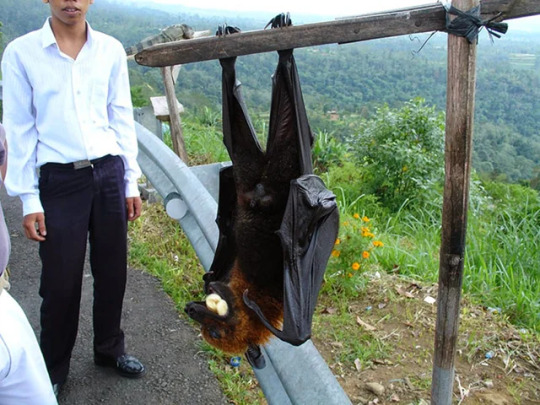
BUSH SURVEY Every now and then I accompanied the surveyor to carry out measurement activities. On a very hot afternoon, after the usual torrential rain, we were close to a half-collapsed bridge, one of those that we would have had to rebuild, and on which traffic was currently flowing in alternate directions. We entered the tall grass, the local surveyor with his assistant were ahead of me by about ten metres, when suddenly they came back running and shouting ''SNAKE .....SNAKEEEE.........''!! We all started running backwards along the path barely visible in the thick vegetation. When we arrived at a layby, we stopped, out of breath.
What did you see – I ask.
A big snake Sir, very big!
Ok – I told him – let's go back there
No Sir, it can be very dangerous, Sir!
Take the machete from the pick up and then let's go and see. We retraced our steps, advancing cautiously through the tall grass. The faces of the two Bengalis were ashen. As we approached the point where they had seen the snake, they slowed down more and more. Finally we saw what had scared the two boys to death: a skin of what an expert would later tell us was a Python reticulatus, the longest snake in the world, as well as being the longest of all reptiles. The Bengalis began to laugh, that nervous laugh you get when you have escaped danger. We recovered the skin, and took it into town to the local Wildlife Office.

LOCAL DRIVING LICENCE I had an appointment for the exam to obtain my local driving license. I was sitting in the office of Police Chief, a fat guy, who, using a long, thin bamboo stick, was pointing out signs with Bengali writing on the room wall.
What does this mean? - he said.
I don't know, Sir – I replied
And what does this mean?
I don't know, Sir.
He looked at me sideways – and what does this mean?
Again Sir, I don't know….
Let's make one last attempt: what does this say – the officer asked me, pointing to a doodle written in green.
I'm really sorry, Sir, I don't know......
But you - said the Officer - can you read the characters written in Bengali?
No Sir.
Then why didn't you tell me?
You didn't ask me, Sir. He collapses into his chair, behind the desk - then all in one breath, without looking at me, he said:
Give me 1,000 Taka (9 euros) -I put the bills on his table. -He stucked my photo on a beige booklet, he affixed a couple of stamps and then while giving me the driving license he said:
Be careful while driving – good bye! I had passed the exam.
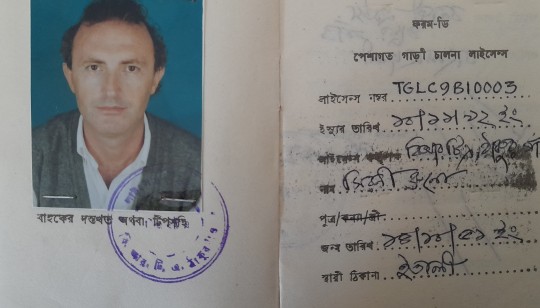
SECRETARY Our secretary was a small girl, with delicate features, prettier than the average Bengali woman. She was in her 30 but she looked less than 20, and she had been married for sometime. One day I asked her how many children she had and she replied:
Three Sir, a boy and two girls - I got the 10 year old boy from my husband, then he left and I haven't known anything about him for years.
But ......beg your pardon ....your daughters ...who's the real father?
I don't know Sir – she replied – at night we all sleep in a large room, we don't have electricity and it's dark – so I don't know exactly who the father of the two girls is. Too sad......
HINDU TEMPLE VISIT. I had learned of the existence of the very important Hindu Kantajewm temple, around 40 km away from Thakurgaon. Kantanagar Temple, commonly known as Kantaji Temple or Kantajew Temple in Kantanagar, is a late medieval Hindu temple near Dinajpur. Kantajew Temple is a religious building built in the 18th century. The temple belongs to the Hindu Kanta or Krishna and this is the most popular with the Radha-Krishna (memorable love assembly) cult in Bengal. This temple is dedicated to Krishna and his wife Rukmini. Built by Maharaja Pran Nath, its construction began in 1704 AD. and ended during the reign of his son Raja Ramnath in 1722 AD. It is an example of terracotta architecture in Bangladesh and once had nine spiers, but all were destroyed in an earthquake in 1897. The driver took me there in a Friday afternoon. The temple was beyond a marshy area and a man with a rowboat ferried us to the island. Taking advantage of the relative isolation, a small community of Hindu fishermen and farmers who had settled there were little safer, in a country where 99% of the population is Muslim. I met a group of Hindu pilgrims from a Dakha school, visiting the temple. And I spoke to the ''Guru'' of the temple itself, a small, elderly man with a face lined with a thousand wrinkles. In truth the temple was very beautiful and large. It was a beautiful afternoon, and I retain the memory of an enchanted and timeless place, where miserable human events lost their meaning.
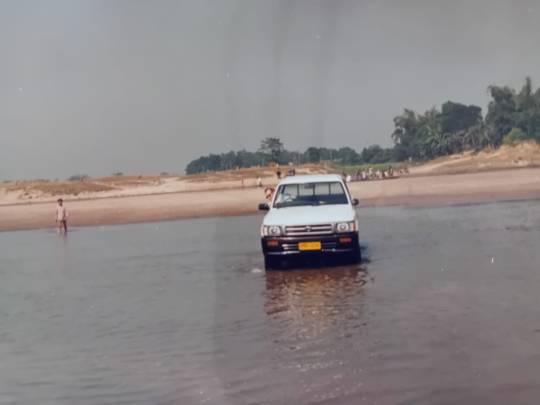

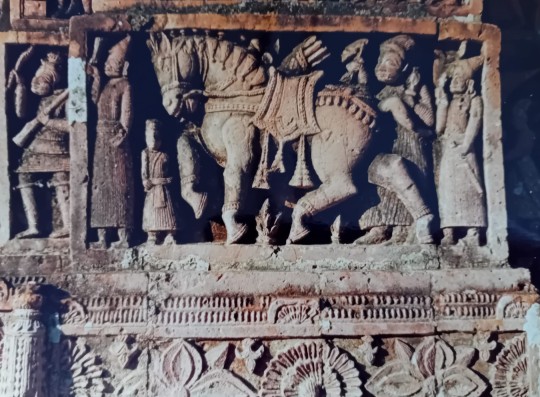
CHOLERA There is an unwritten law in the country: up to 500 deaths a day, the press and television report the news as ''dysentery''. Between 500 and 1000 deaths per day the news is given as a ''possible cholera epidemic, the case investigations are underway''. Starting from a more significant number of daily deaths, the area of infection is subjected to lockdown, in an attempt to limit the proliferation of the disease. In the country there are thousands of deaths per year from these epidemics.
AMBULANCES As a country at the bottom of the list of underdeveloped states, Bangladesh was and is the object of continuous aid and donations from International Organizations. In 1992, the Croix Rouge of Belgium collected enough donations to purchase two modern Mercedes ambulances to ship to Bangladesh. Arriving by ship at the port of Chittagong, the two ambulances could not be unloaded. The local customs asked the Belgian Croix Rouge to pay the import taxes. The Belgian Ambassador, present at the port and waiting to attend the ceremony of delivery of the ambulances to the local Red Crescent, realizing that the problem was not solvable, ordered the ambulances to be brought back to Belgium.
TETULIA A Friday, a day of rest in Bangladesh, I left for an excursion to Tetulia. Also known as "The City of Dreams", Tetulia is a city in the far north of Bangladesh - tea, orange and pineapple cultivation is abundant in its surroundings and is located on the Indian border with Darjeeling. It was a wonderful day, and from the heights of the city I saw the snow-capped Kanchenjunga shining in all its beauty, the third highest mountain on earth, less than 100 km away as the crow flies. In addition to the shining Himalayan mountains, I also saw the very high fence that the Indian Government had installed along the border to try to prevent the illegal immigration of Bangladeshis into India. In 1992, India launched an operation called 'Push Back' in an attempt to repatriate many of the 20 million-plus Bangladeshis living in India illegally.

Mr. CODA. A morning, after breakfast I went to the office: I needed to speak to the Site Manager, but Mr. Coda had not yet arrived. I waited in vain for his arrival for about hour, then I asked the secretary-factotum - a very smart Bengali guy - to accompany me to the site manager's house. We knocked in vain and then called the cleaning girl who had a passpartout key. Once the lock was opened, the door resisted because Mr. Coda's body was on the ground against it. The secretary heard his heartbeat and gestured to me with his thumb: he's breathing, he's still alive! We put him on the bed, the nurse had arrived and was carrying out some maneuvers to try to resuscitate the poor guy. In the end Coda reopened his eyes, he was obviously dazed but managed to blurt out a few words like ''my heart… my heart''. A nitroglycerin tablet was placed under his tongue, in the meantime I had gone out to call the driver and have the Toyota prepared to transport Mr. Coda to the Italian Missionaries' hospital. So within a few minutes we placed the poor guy in the Toyota with the seat reclined. I took a seat next to him and we left for the hospital. The 40 km that separated us from the hospital were traveled at the maximum speed allowed by the condition of the road and traffic. When we arrived in front of the hospital Father Rodolfo was out there. He saw Coda's suffering face and said:
Poor thing! What happened to him?
I think he had an heart attack Father!
Ohh…poor guy…eeeehh…I mean…did you bring any medicine with you?
………………….. I was speechless…….
Sorry Father… the medicines… to tell the truth we… thought that the medicines… you had them here… it's a hospital here no?…
Noo……noo…here we just have some sedatives……and something for colds and flu….
So we came all this way for nothing?
No why? We can pray together…….
Thank you Father……. We retraced our steps, while Mr. Coda seemed to be doing a little better. Before leaving the base, I had asked the secretary to call Dhaka and inform the Branch of what had happened. When we were back in Thakurgaon, Branch had called to say that an air ambulance SOS Medical from Singapore had been alerted, and that it would arrive at Dhaka airport the following afternoon to evacuate the patient. The problem was to transport Coda to Dhaka, 700 km away. On the plane it would have been dangerous for a person with an ongoing heart attack. It was decided to leave immediately for Dhaka with the Toyota, me, Coda and the driver. It was a difficult journey, 700 km of very bumpy state roads, with the crossing of the Brahmaputra river by locals ferry, a small boat made of colored wood and sheet metal where sixty people and two cars were piled up. The crossing took almost two hours, and takes place by cutting the river diagonally, because the current does not allow otherwise. After a journey of over 15 hours, we arrived at Dhaka Airport in the afternoon. Our local customs officer was waiting for us and had already negotiated permission to access the plane's parking area by car. Mr. Coda was quite well, considering his state of health and the long difficult journey from Thakurgaon. The Singaporean doctor and nurse welcomed him on board the plane which was a real flying operating room. They checked his health, put him to bed, immediately hooking him up to various machines. We said goodbye to Coda, wishing him good luck. The next day I returned to Thakurgaon by airliner, leaving the driver the ''pleasure'' of returning alone.

After a few days, we were informed that Coda had passed the critical phase, and once he had fully recovered he would return to Italy on an commercial airliner. We were requested to send his belongings to Dhaka.
PROMOTION I was therefore promoted to the new Construction Site Manager, I must say to the happiness of all the employees, both expatriates and especially locals, who did not take kindly to my predecessor's frequent outbursts. One of the first measures I took was the dismissal of the cook and the promotion of his deputy. It happened one day just before lunch - I saw that Bengali cook returning from his shopping with a motor rickshaw. On the seat next to him, from a distance, I couldn't make out clearly, but I thought I saw bags of cement! I left the office and approached the canteen, noticing that the cook was unloading some bags of cement, yes, but they contained rice, flour, grains!
But you've gone crazy or what??? ! I told the cook, already annoyed.
Why Sir? Why are you telling me this? He answers me with the most surprised face
Why?? you're transporting the stuff that WE eat in bags where before there was cement! And you ask me why I get angry??
But Sir……I eat this stuff too, not just you….
You can poison yourself as you like, but you can't poison us!! Okay, let's go to the kitchen, while we're on the subject I want to do an inspection. We went into the kitchen, and what I saw took away all my doubts:
Abdulkharim…come to the office…immediately! When we were in the office, I called the secretary and in front of the cook I ordered him to prepare the letter of dismissal and all his entitlements - I wanted him out of the camp by evening. In the afternoon Abdulkharim again asked to speak to me.
Tell me quickly, I don't have time to waste with you…
Sir, I'm very sorry Sir……and in any case you will appoint the assistant chef as the new head chef in my place.
And then?
Well you don't know what he does when you Italians are absent and can't see! -What does he do?
He takes one of the girls into the storage room and then………
Really??
Yes Sir….
Well, then in this case I will give him a raise… goodbye.
Well…Sir…
Fatimah accompanies this gentleman out.
BENGALI MINISTRY OF TRANSPORT VISIT The rehabilitation of the Dinajpour – Panchagar road was a project of National interest. One day a visit by a government delegation led by the Minister of Transport was announced. I got in touch with the Dhaka branch, and informed them about the visit. They were already aware of it, and they told me that the commercial attaché of the Italian Embassy in Dhaka, Mr. Colombo, would also participate in the event. On the day of the visit everything was ready to worthily receive the Minister. But with my desappointment, the Italian Embassy chose a ''low profile'' and denied permission for Mr. Colombo to reach Thakurgaon and attend the Minister's visit. I therefore found myself alone in front of a large delegation from the Ministry, whose members all had questions to ask and curiosities to satisfy. Nonetheless, the visit went well: the Minister was satisfied with what he had seen, and was impressed by the crushing plant (a premiere in the country). The visit ended with a reception at our compound, during which traditional Bengali dishes were served.

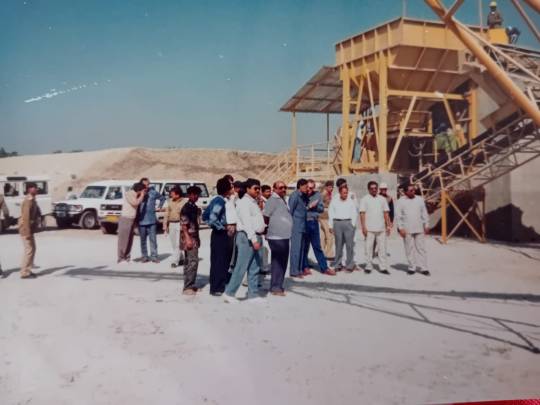
The next day I was informed by the secretary that in the evening, on the state channel, the news would be broadcasting a report on the Minister's visit - so I saw myself on TV, and I must admit that it wasn't bad at all. Following the reportage, sometimes in the shops or cafeterias of Thakourgaon I was ''pointed out'' by someone who had seen me on TV. However, the lack of participation on the part of BONATTI, the Italian Embassy, and in general the news coming from Italy, where the Company was heavily investigated by the Judiciary, had generated a sense of abandonment and distrust in the local staff.
DIESEL We had enormous logistical difficulties, and one of the most critical was the continuous lack of diesel and fuel in general. The supply took place through tankers which sometimes arrived from very far away. There was a particularly difficult period, in which many construction operations had to be suspended due to lack of fuel. One day we were notified that a tanker with 33,000 liters of diesel had left from Dhaka – 700 km away – towards Thakurgaon. The wait became exhausting, especially due to the obligation to sip the remaining diesel. After 2 days we were informed that in a village about 30 km from Thakurgaon a tanker - probably ours - had had an accident. We left immediately to go and check, once we arrived on site we found that it was the tank intended for us that had had the accident. The driver, probably tired from the long journey, had fallen asleep, the truck had ended up in the drainage ditch next to the road, and had tilted onto its side. The usual crowd that had appeared out of nowhere had gathered to witness the accident, and everyone watched impassively as the fuel leaked from the open manholes of the tanker and flowed into the drainage ditch and then towards the nearby river! Nobody did anything to stop the disaster, and that was precisely the reason why Bangladesh was the country it was: not even in the face of accidents, spreading infections, natural disasters, these people moved a muscle! They simply watched helplessly. The driver was unharmed, but in shock. Luckily we found an old crane and within an hour we managed to right the truck – half the fuel load had gone into the river, unfortunately. The vehicle was damaged and unable to continue, we left a couple of people to guard the tank. The next day we sent another tanker to transfer the remaining diesel, and then finally reach the Thakurgaon field.


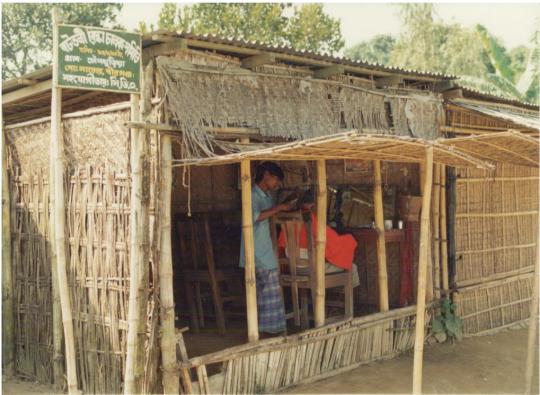
2 notes
·
View notes
Text
sooo i got hired again?
i mentioned like way back in fucking OCTOBER that i'd been hired to teach private violin lessons at a lil music school franchise. signed the paperwork and everything. attended an orientation meeting with other new hires. set up my account with their scheduling/payroll software. sent a headshot and a bio for use on the website. all that was left for me to do was wait for them to sign students up and add them to my schedule.
i have been given 0 students and earned 0 dollars since then. for a while, i had been religiously checking my email so i wouldn't miss any emails notifying me about new students. but i don't even bother anymore. as far as i know, i'm still technically an ~employee~ and i still receive the mass emails reminding all faculty to send in their invoices 🙃 which i find laughably insulting to me.
anyway, i finally started applying for other shit and just got hired with another business, also teaching private violin. they even had me come in and do a ~trial lesson~ where i basically give the manager a violin lesson as if he was a brand new beginner.
y'all.
i have taught with like 5 or 6 different organizations over the years, and until now, ZERO of them ever did shit all to make sure i or any other teachers actually knew how to teach or play the instrument at all. this is the ONLY TIME i was ever asked to demonstrate my abilities, and it gave me sooooooooooo much confidence in the possibility that maybe this business is gonna be different from the other one's i've worked for, and maybe they'll actually value my expertise, and give me the freedom to do what i know how to do in the best way that i know how to do it, and they'll trust my judgment, and most of all, that they'll GIVE ME STUDENTS AND FUCKING PAY ME TO TEACH THEM OH MY GODDDDDDD WHY GO THROUGH A WHOLE FUCKING INTERVIEWING AND ONBOARDING PROCESS JUST TO FUCKING IGNORE MEEEEEEEEEEEEEEEEEEEEEEEEE FOR THE REST OF ETERNITYYYYYYY I AM SO UPSET!!!!
but not as upset anymore lmfao since now i hopefully have a job that's actually gonna, ya know, pay me for doing tasks.
and??????? the wage is hella fucking decent. $40/hr. If I was managing my own studio and doing all my own marketing and bookkeeping and scheduling and all that, the minimum i charge is $50. so $40 is a very very decent deal for a scenario where all i have to do is teach, and not worry about any of the businessy stuff.
but i do intend to eventually prove that i'm worth eeeven more than that. 😊 cop myself a lil raise in the future.
5 notes
·
View notes
Text
RiseBird: Transforming Technical Hiring with Video Interview Service.
A groundbreaking solution has been developed in Bangalore, the epicenter of India's tech boom, to handle one of the most urgent problems facing businesses today: finding top-tier tech talent. Risebird, a Bengaluru-based video interview platform, is used by businesses for their tech jobs.Ready to revolutionize the way requirements are handled. Risebird is ushering in a new era of efficiency and effectiveness in the hiring process with an exclusive combination of "Hire Technical Interviewer" services and a pioneering "Interview-as-a-Service" platform that enables on-demand interviewing.
Hire Technical Interviewer Services:
Risebird's ability to provide highly qualified and specialized technical interviewers is one of the company's key selling points. Finding and evaluating the appropriate technical expertise can be a difficult task in today's tough job market. Risebird is aware of this difficulty and has built a pool of skilled technical interviewers who excel at assessing applicants from diverse backgrounds.
Whether you're looking for engineers, data scientists, software developers, or cybersecurity specialists, Risebird's technical interviewers are knowledgeable about the specifics of each position. They add sector-specific experience to your recruitment process, guaranteeing a thorough and accurate assessment of candidates. Not only does this free up valuable time for your internal teams, it also significantly increases the efficiency of the technical appointments you hire.
youtube
Interview-as-a-Service (IaaS):
“Interview-as-a-Service” offered by Risebird is revolutionizing the talent acquisition industry. Both recruiters and potential candidates can benefit from the intuitive and user-friendly experience provided by this state-of-the-art platform. Modern video technology is used to provide remote interviews that are just as intimate as in-person interviews.
Here's how it works: Recruiters can schedule interviews with candidates, who can choose from a variety of formats and role-specific interview questions. The Risebird platform manages all the details, including scheduling interviews and managing the recording and replay of videos. This not only streamlines the process, but also frees up recruiters to focus on what really matters – evaluating candidates' qualifications and potential.
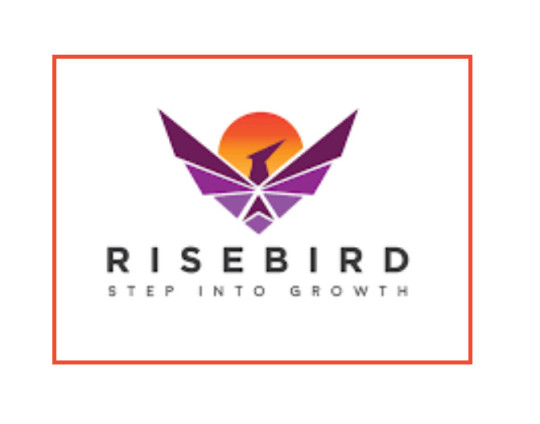
On-demand Interview Services:
Risebird provides the flexibility that the current job market demands through its on-demand interviewing services. Risebird has you covered whether you need to fill a critical position immediately, have had an unexpected increase in hiring demands, or simply want to maintain a steady flow of talent. You can conduct interviews on your schedule and at the push of a button, avoiding hassles and ensuring a steady stream of qualified applicants.
The RiseBird Advantage:
Risebird offers an exclusive blend of know-how, cutting-edge technology and unique convenience features, ready to improve the effectiveness and success of your recruitment process. Here are some reasons why companies looking for technical skills prefer Risebird
Quality Control: By ensuring that only the most qualified applicants advance through your hiring process, our skilled interviewers reduce the chance of costly hiring errors.
Cost-Effective: Risebird's Interview-as-a-Service reduces your recruitment costs by removing the need for substantial travel and resource allocation.
Time Efficiency: Say goodbye to time-consuming logistics and scheduling hassles. The employment process is streamlined by Risebird, enabling you to make quick, data-driven decisions.
Global Reach: Risebird's platform makes it easy to conduct interviews with applicants from around the world, giving you access to a talent pool that isn't bound by location.
Flexible Scaling: Adjust the size of your recruitment initiative as needed to guarantee that you always have the best talent for your projects.
In conclusion,Risebird, a Bangalore-based video interview platform, offers a full range of services that is revolutionizing the way businesses approach tech hiring. Risebird gives companies the tools they need to empower strong technical teams more quickly and with better assurance. These tools include technical interviewer services, interviewing as a service, and on-demand interviewing capabilities. If you're ready to take your technical recruiting process to new heights, Risebird is your trusted partner on this journey.
#RiseBird#On-demand Interview Services#Interview-as-a-Service#Hire Technical Interviewer Services#video interview platform#Youtube
3 notes
·
View notes
Text
Here's the thing:
The job advert is also lying.
You will probably be taught the systems you need to know on the job because every job is different.
Unless it is part of your qualification (e.g. an accountant needing to know excel) you probably don't need a fully functioning working knowledge of everything listed on the job advert because most companies use their own systems anyway.
A familiarity with Teams is great! Your company probably has about seven Teams plug ins that you've never seen before and they will teach you about them. If you don't have a familiarity with Teams you will probably have to do a Microsoft training about it, but if your other skills match the job the company won't mind too much.
LIKEWISE: There are so many different, tiny, tiny things that you probably will not have a working knowledge of even half of them and will be taught in your first week or so. When they post "Must have a working knowledge in xyz" what they really mean is "You should have a bit of knowledge about something similar to xyz and we will adapt as necessary."
Obviously this is not "We're looking for an engineer, mechanics apply!" because they're two different fields, but "You should be familiar with XYZ point of sale software" is not the dealbreaker you think it is. If you have a working knowledge of computers and how numbers work, they can teach you the rest.
They're posting what they want the ideal candidate to have. If you're not perfectly ideal, still apply for that job because 1) they might not get the ideal candidate and 2) they want the best fit. If they do get the ideal candidate but he's a family man who will only work three days when you, slightly less ideal but can work five and presented really well at the interview, also applied, you're more likely to get the job than him. Likewise if they're looking for someone to work part time and the ideal candidate's schedule means they're going to have to shift people about, but yours doesn't? They're more likely to go with you. OR if the ideal candidate also has a chronic case of stick-up-their-ass and will cause friction with a jokey, less serious work force and you won't? You'll get the job.
The ideal candidate is just the ideal. People will go for the best pick whether or not they perfectly match.
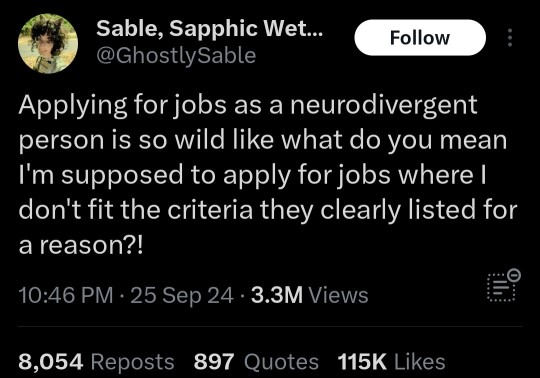
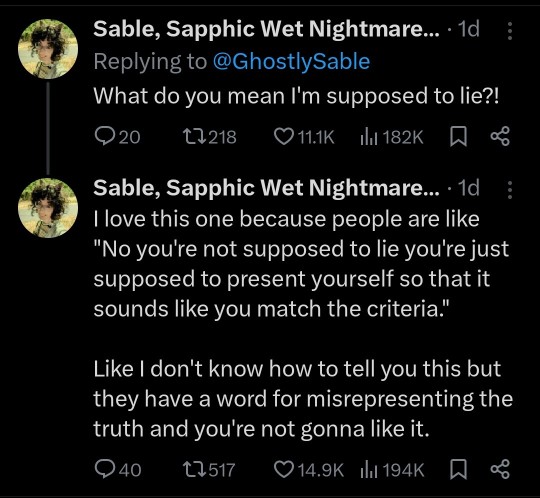
122K notes
·
View notes
Text
Master Your Career with Full Stack Java Programming – Learn from the Best Platform for Courses
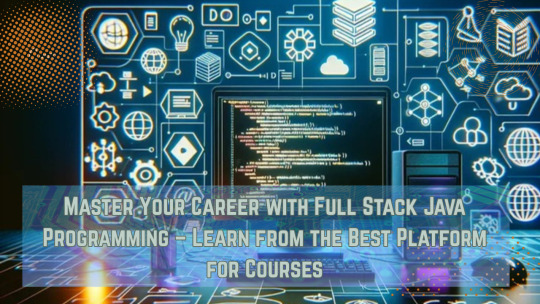
In today's competitive digital world, having a strong command over full-stack development can set you apart from the crowd. Among various technology stacks Full Stack Java programming stands out as a robust, reliable, and high-performance choice for web and enterprise application development. But where you learn it matters as much as what you learn. That’s why choosing the best platform for courses is the first step toward success.
Whether you're a fresher aiming to land your first tech job, a working professional planning to upskill, or someone transitioning into a software development career, enrolling in a Full Stack Java programming course from a reputed platform can open the doors to immense opportunities.
What is Full Stack Java Programming?
Full Stack Java programming refers to the development of both the front-end (client-side) and back-end (server-side) of web applications using Java technologies. It typically includes learning:
Front-End Tools: HTML, CSS, JavaScript, React.js or Angular
Back-End Frameworks: Java, Spring, Spring Boot
Database Management: MySQL, MongoDB
Version Control: Git, GitHub
Deployment: Docker, Jenkins, AWS, etc.
This comprehensive approach empowers developers to build fully functional and scalable web applications from scratch.
Why Choose the Best Platform for Courses?
The best platform for courses ensures not only high-quality content but also real-world project experience, expert mentorship, industry-recognized certifications, and placement support. Here's what makes a platform the best:
Industry-Aligned Curriculum
Experienced Trainers
Hands-on Projects
Flexible Learning Modes (Online/Offline/Hybrid)
Affordable Pricing with EMI Options
Job Assistance or Internship Opportunities
Choosing the right platform can make your learning journey smoother, faster, and more rewarding.
Key Benefits of Learning Full Stack Java Programming
Here’s why Full Stack Java Programming is a game-changer for tech enthusiasts:
1. Versatility in Job Roles
Once you master both the front-end and back-end, you're eligible for a wide range of job roles:
Full Stack Developer
Java Developer
Back-End Developer
Software Engineer
Web Developer
2. High Demand in the Market
Java is one of the most used programming languages globally. Companies are constantly in search of skilled Full Stack Java Developers to handle end-to-end development.
3. Lucrative Salary Packages
Due to their diverse skill set, Full Stack Java Developers often command higher salary packages than specialists. Freshers can start with competitive salaries, while experienced professionals enjoy even more lucrative offers.
4. Complete Control Over Projects
As a full stack developer, you understand the complete architecture of an application, which allows you to contribute more effectively to the development lifecycle and take on leadership roles.
5. Better Freelance & Startup Opportunities
Freelancers and entrepreneurs benefit greatly from Full Stack Java skills. You can build entire applications independently or with a small team, reducing development costs and timelines.
6. Community Support and Resources
Java has a vast global developer community. Whether it’s troubleshooting, new trends, or open-source tools, you’ll always find help and support.
Why Our Platform is the Best Platform for Courses
Our learning platform is designed to empower you with job-ready skills and real-world knowledge. Here's what sets us apart as the best platform for courses:
✅ Comprehensive Java Full Stack Curriculum
✅ Expert Mentorship from Industry Professionals
✅ Real-Time Projects & Assignments
✅ Live Classes + Recorded Sessions
✅ Placement Assistance with Resume Building & Mock Interviews
✅ Internship Opportunities to Build Your Portfolio
✅ Certification Recognized by Top IT Companies
With flexible learning schedules, weekend classes, and doubt-clearing sessions, we ensure every student gets personalized attention and career guidance.
Final Thoughts
Full Stack Java Programming is not just a skill—it's a career-transforming toolkit that can help you become a valuable asset in any software development team. By choosing the best platform for courses, you're investing in your future with the right resources, mentorship, and career support.
Don’t wait to make the leap. Whether you're just starting out or planning your next career move, mastering Full Stack Java Programming with us can be your smartest decision yet.
🚀 Start your journey today — enroll now with the best platform for courses and become a certified Full Stack Java Developer!
0 notes
Text
Best Spoken English Institute in Vijayanagar

Zonal Tech Solution – The Best Spoken English Institute in Vijayanagar
Are you searching for the best spoken English institute in Vijayanagar that can help you master English communication with ease? Look no further! Zonal Tech Solution is renowned for delivering high-quality spoken English training tailored to meet your individual learning needs.
Why is Zonal Tech Solution the Best Spoken English Institute in Vijayanagar?
Choosing the right institute is crucial for effective learning. Here’s what makes Zonal Tech Solution stand out:
Experienced Trainers: Our instructors are industry professionals with years of teaching and corporate experience.
Interactive and Practical Approach: We focus on real-life communication through conversations, role-plays, and group discussions.
Personalized Learning: Small batches ensure each student receives individual attention.
Comprehensive Curriculum: From basic grammar to advanced fluency, we cover everything you need to speak English confidently.
Flexible Batch Timings: Weekend and weekday batches to suit your schedule.
Placement Assistance: We prepare you for interviews and help you secure your dream job with excellent communication skills.
What You Will Learn at Our Spoken English Institute
Basic to advanced grammar essentials
Vocabulary building and usage in daily life
Pronunciation and accent neutralization
Listening skills with comprehension exercises
Effective communication and interpersonal skills
Interview preparation and presentation skills
Confidence building and personality development
Convenient Location in Vijayanagar
Situated in the bustling area of Vijayanagar, our institute is easily accessible by all modes of transport. The learning environment is friendly, supportive, and equipped with modern facilities to make your experience productive and enjoyable.
Student Success Stories
“Zonal Tech Solution transformed my spoken English skills. The trainers are very supportive, and the practical approach helped me speak fluently in just a few months.” — Priya K., Software Engineer
“I joined several institutes before, but none matched the quality and attention I received at Zonal Tech Solution. Highly recommended!” — Manoj R., Sales Executive
Ready to Join the Best Spoken English Institute in Vijayanagar?
Don’t wait to improve your English speaking skills. Join Zonal Tech Solution today and take a confident step towards a brighter future.
📞 Contact Us: 810038851 🌐 Visit: www.zonaltechsolutions.com 📍 Address: Vijayanagar, Bangalore
Speak English Fluently. Build Confidence. Achieve Success – Only at Zonal Tech Solution!
0 notes
Text
I work in public service in a data analytics kind of role, our hiring system is a little different in a way that trips people up. Here's a few job application tips in my area:
Applications
The questionnaire that we have you fill out tells you exactly what we care about. Be as direct as you can in answering those questions. If you're asked to tell us your experience with statistical analysis you should be giving the two sentence description of the statistical analysis you've done. Cut all the fluffy buzzwords. I just want to know what methods you've used and how long you've been using them.
Never say you have no experience with something listed as required in the job ad, tell me about the most closely related thing you do have experience with.
Don't worry about your answers being repetitive. You used both statistical methods and statistical software on the same project? Great! Talk about it twice. There's a scoring rubric behind the scenes that means we mainly consider only one answer at a time and will have mostly forgotten what you said in question 1 by the time we get to question 2. Be careful though, the questions are different and tell you exactly what we're looking for.
Don't email us to try to get around the process. We're not allowed to take anything outside of the official process into account. You cannot get around the official process by trying to set up a quick chat about the job. You don't need to demonstrate your enthusiasm or your hustle at this stage and the process is designed to de-emphasize those things, but you sure can be annoying. We have jobs that are not screening job applications. Just wait. The process will play out in due time.
Interviews
Our interviews go like this: we will start by introducing ourselves and give a short introduction to the role. Then we will ask you 4 to 6 questions.
The questions will be prescripted. We ask every candidate exactly the same things. You will probably be given the whole list right at the beginning of the interview. You may be given 5 to 10 minutes alone to consider your answers before we begin. You will probably be told you can answer them in any order you like and be given an opportunity to go back and add to any of your answers at the end of you want. You don't have to.
Your interviewers will take notes the whole time. They will not make eye contact because they are busy writing down what you are saying. The pacing will be odd and may not feel very conversational with weird silences while they write. We're trying to make you feel comfortable, but we need to be able to document our decisions.
The questions will be things like "Tell me about a time when you had to do X, how did you approach the problem? What was the result?" This is your chance to tell us about the cool things you've done! Be enthusiastic! Do not treat us like idiots! We too have advanced degrees and a whole bunch of technical experience. Give the explanation geared to the technically minded peer who has not been involved in your project. We're also not allowed to fill in the blanks for you. Be explicit about the methods you've used.
There may be follow up questions that were not prescripted. Say more! We're trying to get you more points in the omnipresent behind the scenes rubrics.
If you've never had to do X, tell us what you would do if you did.
You can sort of predict some of the questions you will be asked by carefully reading the job posting. If it says we care about communication you may be asked to talk about communicating. If it says the job requires leadership you can expect a question about leadership. The best answers go beyond your immediate work to consider how others are affected. If you're interviewing for multiple jobs in public service you may see the same questions again. We're all choosing from the same list.
Use the interview length to determine how much you should say. If there are 5 questions and the interview is scheduled for an hour, you want to talk for 8-10 minutes or so on each to leave some extra time.
There will be time for you to ask questions at the end. Ask things about the job that you are genuinely interested in. Unlike in other industries we're not evaluating you on the contents of your questions. Therefore ask questions about the job that you want answers to, not questions that you think will make you look good. If there's been a good discussion about the job itself already, not having questions won't hurt you.
The question above about the day to day work is a good one. But all the others are bad. Questions about the projects that the team is working on or the history of the role would be great. Questions about the process are fine. Trying to sell yourself at this point just reveals that you don't know how the public service operates.
Your clothing matters very little. We're not supposed to consider it. Wear something that makes you feel professional.
A couple job interview hacks from someone who has to give a job interview every single goddamn day: (disclaimer: this goes for my process and my company’s process, other companies and industries might be different)
1. There are a few things I check and a few questions I ask literally just to figure out if you can play the game and get along with others in a professional setting. Part of the job I interview for is talking to people, and we work in teams. So if you can’t “play the game” a tiny bit, it’s not going to work. Playing the game includes:
- Why do you want to work here? (just prove that you googled the company, tell me like 1 thing about us, I just want to know that you did SOME kind of preparation for this interview)
- Are you wearing professional clothing? I don’t need a suit just don’t show up in a ratty t-shirt and sweatpants.
- Are you able to speak respectfully and without dropping f-bombs all the time? Not because I’m offended but because I don’t want to be reported to HR if you wind up on my team.
- Can you follow simple directions in an interview?
2. Stop telling me protected information. I don’t want to know about what drugs or medications you’re on, I don’t want to know about you being sick, I don’t want to know if you’re planning to have children soon, I don’t want to know anything about your personal life other than “can you do the job?”
3. When we ask, “What questions do you have for me?” here are my favorites I’ve heard: - What does the day-to-day look like for a member of your team?
- If one of your team members was not performing up to his usual standard, what steps would you take to correct that?
- What can I start doing now to accelerate my learning process in this job?
- What are some reservations you have about me as a candidate? (be ready for this emotionally….it will REALLY help you in the future, and I’ve had people save themselves from a No after this, but can be hard to hear)
- In your opinion, what skills and qualities does the ideal candidate for this job possess?
- What advice would you give to a new hire in this position/someone who wanted to break into this industry, as someone who has worked here for a while?
Those are just my tips off-the-cuff. I work in sales in marketing/SAAS, so these can be very different depending on the industry, but I wish the people I interview could read this before they show up.
57K notes
·
View notes